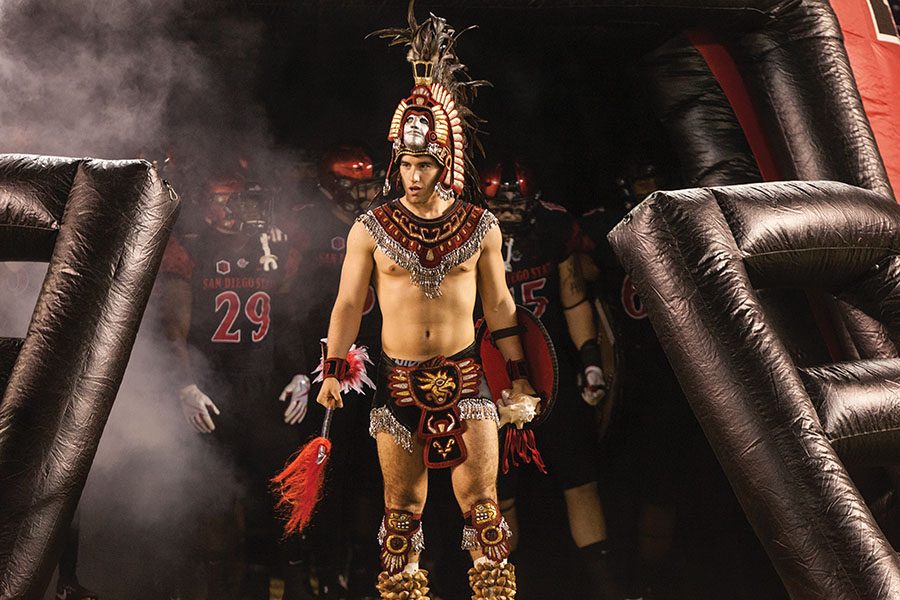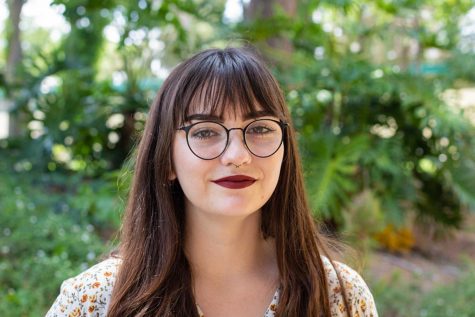This story was updated at 4:15 p.m. Wednesday, Nov. 8 to include an official statement from SDSU.
The University Senate passed a resolution to retire the Aztec Warrior mascot and to form a task force to investigate the appropriateness of the continued usage of the Aztec moniker at a meeting on campus Tuesday evening.
It passed 52-15, with two abstentions.
The final version of the resolution was a combination of two resolutions the University Senate discussed during the meeting, the first of which included a call to retire the current human representation of an Aztec — a figure commonly seen in the stands at sporting events.
It also recommended the university retire use of spears or “weapons that connote barbaric representations of the Aztec culture.”
The second resolution called for creating a task force that will investigate and make recommendations regarding the appropriateness of the continued usage of the Aztec moniker.
The task force will also make recommendations regarding an education component in relation to the Aztec identity.
This was an advisory vote, meaning that university president Sally Roush will be advised of the vote. She may approve or reject the resolution as a whole, or choose to adopt only parts of it.
Senate Chair Marcie Bober-Michel said she is confident the resolution will not be approved by Roush, although this is no reason to believe that the senate’s message is not being heard.
“It sends a signal that this is not the end of the discussion — it’s the beginning,” Bober-Michel said.
Beth Chung, a management professor and member of the Diversity, Equity and Outreach Committee, said the Aztec mascot in its current state is very oppressive for some students.
“The Education Code of California states that singling out the Native Americans through the use of mascots, team names or nicknames creates a barrier to equality,” Chung said.
She said that senate members must also consider the objective negative effects of such mascots.
“The social science literature talks about the harmful effects of this kind of stereotyping,” Chung said.
Marva Cappello, an associate professor of teacher education, said she is strongly in support of resolution.
“I am in support of the resolution because it asks for a gathering of information and we’re a group of academics,” Cappello said. “If we’re not going to be in favor of gathering information then I don’t understand what we represent.”
Carin Crawford, head coach of the women’s water polo team and member of the University Senate, said she believes we need to consider our identities as members of the university community, and that she opposed the resolution.
“I certainly think this is an issue of the identity of the university and what it means to be a San Diego State Aztec, not an Aztec 500 years ago,” Crawford said. “Those are different things.”
A number of protesters from the Native American Student Alliance were also present outside of the meeting prior to its start.
“Today we came with other members in solidarity to show the University Senate that we’re aware of this issue and that our voices will not continue to be silenced,” said American Indian studies junior Lane Yazzie, “and to show them that they’re voting on our behalf and they’re representing students and to hold them accountable.”
American Indian studies lecturer Ozzie Monge, who was also protesting, said the Aztec mascot discussion should not be a question as to whether the Aztec mascot is racist.
“The question is not ‘is this racist?’ or ‘is this problematic?’” Monge said. “It is. The question is ‘do we want this to continue to represent us?’”
SDSU responded to the resolution with an official statement Wednesday.
“Any final decision regarding the resolution will be made by the president of San Diego State University,” the statement read. “SDSU is proud of its long-standing commitment to the shared governance process, of which the University Senate is a part. There can be no question that all viewpoints regarding SDSU’s Aztec identity have a right to be respectfully heard and carefully considered. This resolution provides an opportunity for dialogue to continue among all stakeholders in the SDSU community – including faculty, students, staff, and alumni.”










